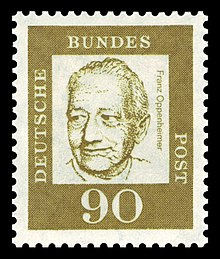Acracy
Acracy (term)
The akratie (Greek from α - (negative prefix) and κρατία , kratía - power, rule, power, strength) describes the political abolition of class society according to Franz Oppenheimer . Since rule was never anything other than “the legal form of economic exploitation”, the acracy is based on the “ideal of a society redeemed from all economic exploitation ”. The political abolition of class society presupposes its economic overcoming.
Democracy theory
The cultural heritage of mankind from the millennia is the domination of the masses by a few (oligocracy) or individuals (monocracy). In contrast, democracy was originally neither a worldview, theory or ideal, but a reaction to the oligocracy with which it is still at war today.
The term democracy expresses the right to co-rule by the people (demos), but is theoretically fuzzy, since a swelling of co-government on a broad basis logically pushes back the rule (kracy) exercised by the minorities.
But what should the word rule of the people mean? Oppenheimer writes: “ Rule was never anything other than the legal form of economic exploitation.” “Since one cannot use 'rule over oneself' to exploit oneself, (...) this proves that when fully realized of democracy, democracy ceases to be cracy and - acracy becomes. "
According to Oppenheimer, an acracy is “the ideal of a society redeemed from all economic exploitation”. The political abolition of class society presupposes its economic overcoming. All the weaknesses of democracy grow out of the oligocratic remnants of pre-democratic times.
Individual evidence
- ↑ http://www.franz-oppenheimer.de/fo14a.htm (All quotations in the online text)
- ↑ http://www.franz-oppenheimer.de/kruck/wk99a.htm (A process which, when it is completed, leads to a state of equality or acracy.)
